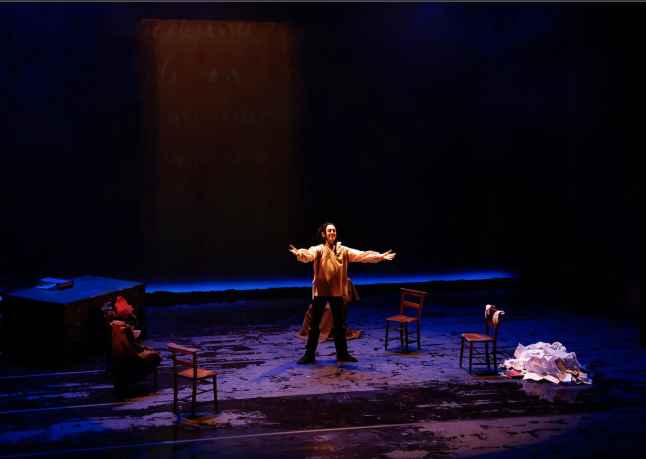While marquee productions have featured star turns from Ian McKellen and Alan Cumming, smaller shows deal with contemporary life.
EDINBURGH — Some big names have been leaving their mark this month in Edinburgh, where both the International Festival and the bustling theatrical grab bag that is the Fringe are in full swing after a slimmed-down pandemic lineup last year. Ian McKellen and Alan Cumming have proved box-office catnip, both of them in dance-intensive enterprises that take already long-established careers in new directions.
There is excellence, of course, among the less well-known talent here, too. But there’s no denying the marquee appeal of McKellen, now 83 and pretty much alone among his generation of British actors in still being onstage. (Too many of his onetime colleagues have either retired or died.) Last year, he gave us a limber, age-defiant Hamlet, for an extended run. And this month, he is revisiting that hallowed text, in a 65-minute fusion of dance and theater that is unremarkable but easy on the eye.

The performance, devised by McKellen and the Danish choreographer Peter Schaufuss, finds the veteran Shakespearean delivering excerpts from the text in his familiar, deep-voiced rumble; all the other performers are dancers, many from the company of the Edinburgh Festival Ballet, which Schaufuss runs. The approach includes Ophelia (an expressive Katie Rose) swooping to the stage floor in grief, Rosencrantz and Guildenstern hopping briefly into view and the charismatic dancer Johan Christensen whirling in torment as the young Hamlet: He and McKellen offer dual aspects of a split psyche. Luke Schaufuss, the choreographer’s son, completes a central triangle of sorts as a model-handsome Horatio in a decorative outing that is watchable, to be sure, but doesn’t run very deep.
Alan Cumming, the Tony-winning Scottish actor, gets the stage all to himself in “Burn,” an official Festival entry in conjunction with the National Theater of Scotland that will travel next month to the Joyce Theater in New York. It’s a portrait in words and movement of the 18th-century poet Robert Burns, Scotland’s national bard, whom Cumming and his co-creator, Steven Hoggett, have conceived as a lank-haired, black-clad goth. (The show finished Aug. 10 in Edinburgh and will tour Scotland before its New York run.)
And what if Burns was 37 when he died — 20 years younger than Cumming is now? The protean actor brings to this assignment a lithe, sinuous physicality that belies his years, while a digital clock counts down the passage of time in Burns’s too-brief life. The show couples enticing visuals (Tim Lutkin’s lighting is suitably stormy) with a canter through Burns’s verse. We’re left at the end with a sweet recitation from in front of the stage curtain of “Auld Lang Syne,” the traditional New Year’s Eve melody, for which this Scotsman wrote the words.
Contemporary themes are being dealt with in Edinburgh, too, even as this year’s celebrity names chose to look toward the past. “Silkworm,” at the Assembly Roxy, tells of a lesbian couple from Nigeria who arrive in Glasgow seeking permanent asylum in Britain.
Written by Vlad Butucea, a Romanian-born, Glasgow-based dramatist, the play is set 17 floors up in a low-income housing project where, we are told, “You can hear the wallpaper peeling.”
Abidemi (a radiant Ewa Dina) is the more expansive of the pair; her partner, Omolade (the intense Antonia Layiwola) is fearful that the authorities won’t recognize the gravity of the women’s plight. That the previous occupants of this same apartment leaped to their deaths amplifies the air of unease: Once their fates are decided, the lovers’ bond gets tested in a slow-burning drama that could be teased out further for greater impact.
Calvin (the live-wire Michael Dylan), the gay man at the endearingly manic center of James Ley’s “Wilf,” is in the process of ending a relationship when we first encounter him center stage, chattering away and wearing a Celine Dion T-shirt. His story, he tells us at the start, involves love, loss and the comfort he takes in the car of the title, a used Volkswagen Polo that he has come to cherish as if it were a person. The play is at the Traverse Theater — always a reliable Fringe destination — and directed by Gareth Nicholls, the house’s artistic director.
Its good nature proves entirely infectious as Calvin learns to motor his way, literally and metaphorically, through the pain of separation, en route to a possible new start with any of the various men he encounters along the way. Neil John Gibson gives vivid life to a broad array of romantic prospects, and a third performer, Irene Allan, is a hoot as a polyamorous onetime therapist. The play’s sexual candor was something of a surprise at 11 a.m. — performance times vary throughout the run — but “Wilf” is highly engaging whatever the time of day, and very touching, too.
“Boris the Third,” at the Pleasance Courtyard, belong to Britain’s prime minister. The writer-director Adam Meggido’s overextended comedy puts center stage a teenage Boris Johnson in a production of “Richard III” at Eton, one of Britain’s most elite boarding schools. The troubled show took place — or maybe not, given that Johnson’s father remembers that the actual Shakespeare play was “Richard II” — with a leading man who, in this account anyway, was more intent on bedding two sisters at once than on learning his lines.
Meggido’s play tries to connect the conniving if doomed charmer Johnson may once have acted onstage to the modern-day leader who has been repeatedly called out for deceit. While it is worth seeing principally for Harry Kershaw’s pitch-perfect performance in the title role, it still feels like a shaky first draft.
I had a much better time at Sonya Kelly’s wonderful “The Last Return,” the best of the seven shows I attended last weekend. Also at the Traverse, this production by the Druid Theater of Galway, directed by Sara Joyce, gathers a disparate array of characters, all clamoring for entry at any price to the sold-out final performance of a fictitious play.
The ebb and flow of the queue is of scant interest to the ticket seller (Anna Healy), who repeats as if by rote that there are no seats left, and the prospective playgoers become increasingly fractious. A disaffected 60-something academic (Bosco Hogan) has tried 36 times to make it through the show but hasn’t managed, because he is incontinent; this performance is his last chance. Among those also jockeying for admission are a battle-scarred American soldier (Fionn Ó Loingsigh) who just wants to rest his feet after the trauma of war and, most memorably, a querulous Scotswoman (Fiona Bell) who offers homemade snacks to the other characters as she angles for a spot at the front.
The lineup of hopefuls also includes a mostly silent Somali woman (Naima Swaleh) who has crossed continents, we discover, to get to the theater and whose final gesture ends the play on an unexpectedly touching note. Chaos, “The Last Return” suggests, lies in wait everywhere, but so, too, do humanity and compassion, if we are lucky enough to experience them — and this play.


